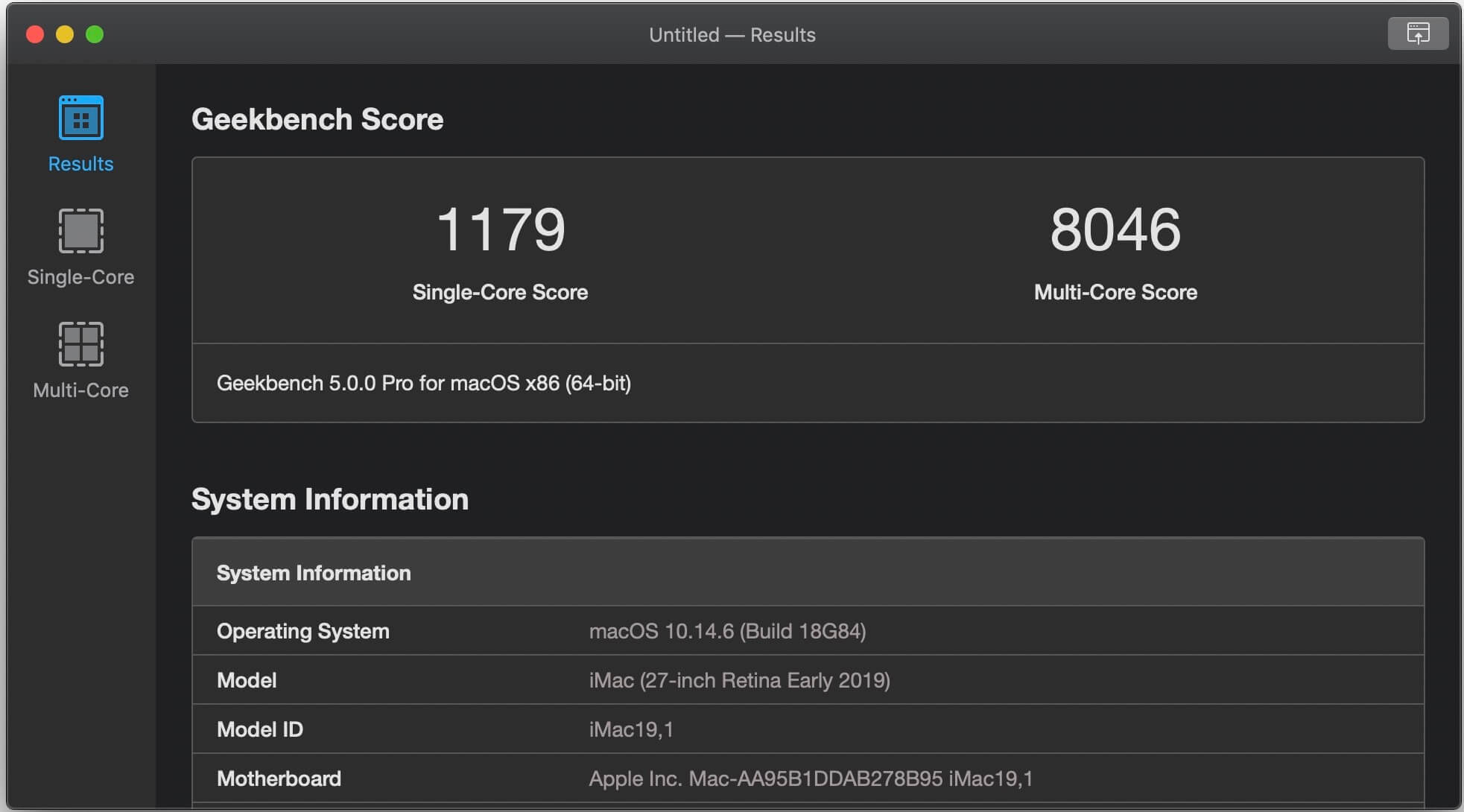
Geekbench 4 supports Android, iOS, macOS, Windows, and Linux. Geekbench Browser. Share your Geekbench 4 results with others by uploading them to the Geekbench Browser. Let other users see how fast (or slow) your devices can go. Create an account and track all of your Geekbench. Apple Mac Benchmarks (Mac Geekbench 2, 3 and 4 Results) Per reader requests, average Geekbench 2, 3, and 4 results submitted to the Primate Labs website for each G3 and newer Mac and all iOS devices are organized by category below. Geekbench results also are provided on EveryMac.com's specs pages for G3 and newer Macs and within the Ultimate Mac Comparison feature. Geekbench 5 measures your processor's single-core and multi-core power, for everything from checking your email to taking a picture to playing music, or all of it at once. Geekbench 5's CPU benchmark measures performance in new application areas including Augmented Reality and Machine Learning, so you'll know how close your system is to the.
Geekbench 2 For Macbook Pro
As reported by MacRumors, eager Apple developers are already posting benchmarks on the developer transition kits for Macs with Apple silicon. These kits are based on the Mac mini chassis but include ARM-derived Apple silicon rather than Intel CPUs.
Before we dig in, it's important to note a few caveats. First, the CPU included in these developer kits may or may not reflect the CPUs included in future Apple Macs. These are not consumer products; they're developer tools. Second, the benchmarks were done using Rosetta, which likely still has many changes and optimizations coming. And thirdly, the developers who've leaked this information are in violation of non-disclosure agreements at Apple.
Developers who wanted access to the kit were required to pay a $500 access fee, agree to return the kit after one year—and agree not to publicly write about, review, share, or display the unit without Apple's prior written approval. At least eight developers so far seem not to have read the fine print, judging by the uploads to Geekbench's online leaderboard.
 There is currently no way of knowing whether these leaks are deliberate or accidental. At Ars, we frequently get to benchmark hardware that isn't available to the general public and whose details are under embargo as well—and we can confirm that you need to pay close attention to what you're doing. Most modern benchmark utilities have an online leaderboard, with an 'upload results' button baked right into the utility—and in some cases, they even upload by default unless you specifically force them not to.
There is currently no way of knowing whether these leaks are deliberate or accidental. At Ars, we frequently get to benchmark hardware that isn't available to the general public and whose details are under embargo as well—and we can confirm that you need to pay close attention to what you're doing. Most modern benchmark utilities have an online leaderboard, with an 'upload results' button baked right into the utility—and in some cases, they even upload by default unless you specifically force them not to.
Accidental or not, the leaks give us some additional information about the potential performance of the new Macs with Apple silicon, though nothing conclusive. The developer transition kits are equipped with what seems to be a variant of the A12Z SoC found in the latest iPad Pro models. These Geekbench database entries also report the virtual CPU as four-core, rather than eight—even though the A12Z as we know it in the iPad Pro is an octa-core CPU.
Four of the A12Z's cores are high-power fast cores, and the other four are low-power slow cores used to increase battery efficiency when running background tasks. This configuration is common in the ARM world but nearly unheard of in x86. So it's not too surprising that an x86 emulation would ignore the big/little configuration and report itself as a simpler four-core setup regardless of underlying reality.
These tests appear to have been run in Geekbench 5.2.0 for macOS x86 (64-bit)—meaning they were run in Rosetta, Apple's tool for emulating x86 Macs on ARM-based Apple silicon.As for the results, the Apple silicon-equipped developer kits average 811 for single-threaded Geekbench and 2781 for multi-threaded. That's about 20 percent slower than the entry-level i3-1000ng4 powered Macbook Air's single-core results and 38 percent faster than its multi-threaded results. Higher-end Macs produce much higher numbers, though.
What's impressive about these leaked numbers is that they're not for Geekbench running natively in ARM mode. These tell us what emulation of legacy apps might look like on Apple silicon Macs—and it's likely early adopters of Apple's new ARM-based Macs will use Rosetta to run at least some apps, so it's a potentially useful insight.
Geekbench 2 Mac Serial
Rosetta 2's performance characteristics aren't well-known enough yet to meaningfully extrapolate the A12Z's native performance—but if the leaked numbers are correct, we can assume it will be quite good.Geekbench 2 Mac
All that said, there is no indication yet that the A12Z will actually ship in consumer Macs. Apple may have plans to introduce a very different chip when it actually comes to market with the new Macs, so while these benchmarks are an intriguing curiosity, they are not certain to be representative of what we'll see when the real deal arrives later this year. These kits weren't designed to reflect the final hardware of Apple silicon Macs.
